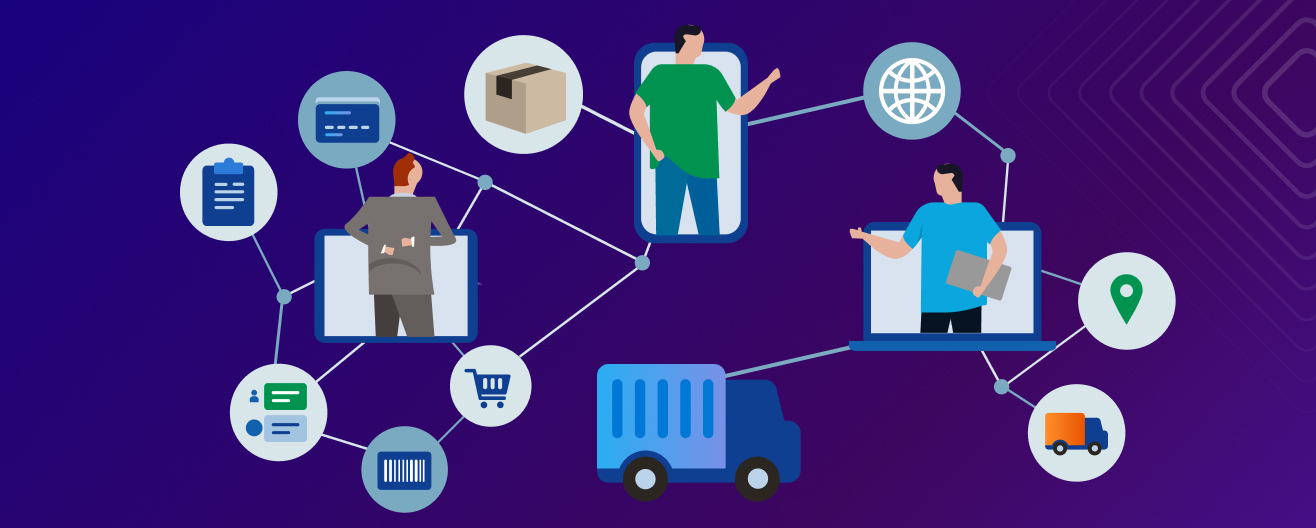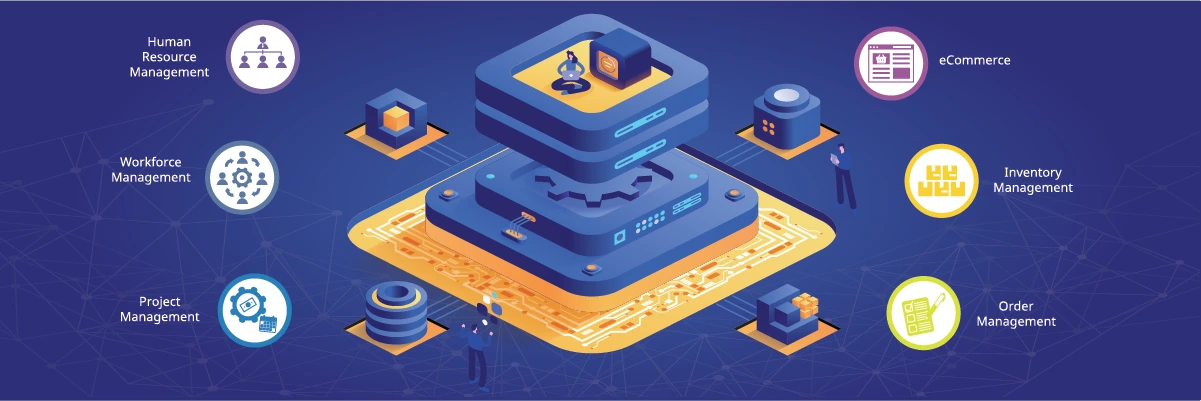
Introduction
Ever wondered how businesses can guarantee the authenticity of products and build trust across complex supply chains? Blockchain in Supply Chain Management is the answer. Blockchain improves supply chain transparency and allows every participant to view real-time, tamper-proof data. This is possible by creating a secure, decentralized, and immutable digital ledger, and to implement such solutions effectively, many companies choose to hire blockchain developers with the right expertise.
Blockchain technology addresses long-standing challenges like fraud, counterfeit products, and a lack of visibility. It tracks products in supply chains right from their origin to delivery.
There are lots of benefits of blockchain in supply chain management. These include enhancing collaboration, compliance, reducing costs, and speeding up processes. Real-world blockchain use cases in logistics show how companies are preventing fraud, ensuring product authenticity, and improving overall efficiency. As supply chains grow more complex, improving supply chain trust with blockchain is essential for businesses that aim to stay competitive and accountable. In this blog, we’ll explore how blockchain builds trust and transparency in supply chain management and why it’s a game-changer for the industry.
The market of blockchain in supply chain management is seeing steady, strategic growth. This is mainly due to its increasing demand rather than just hype. In 2023, the global blockchain technology market was valued at $57 billion, and it’s projected to grow at a remarkable CAGR of 87.7% from 2024 to 2030. This momentum is due to the rising enterprise demand and the emergence of blockchain-as-a-service (BaaS) platforms, which make it easier for companies to adopt blockchain use cases in logistics, tracking, and compliance.
Regional trends are shaping adoption in unique ways. In the United States, regulatory progress and government initiatives around digital identity and supply chain transparency are pushing innovation forward, with strong backing from venture capital. Asia Pacific is leading in growth, as countries like China, Japan, India, and South Korea roll out blockchain for trade, finance, and public services.
Europe is also moving quickly, with clear regulations (like MiCA), cross-border collaboration, and a focus on sustainability. The UK and Germany stand out as leaders, moving blockchain from pilot projects to enterprise-grade solutions, especially in fintech and industry. These developments show that improving supply chain trust with blockchain and tracking products in supply chains are now essential strategies, not experiments.
This global shift means blockchain is evolving from a niche technology to the backbone of secure, transparent, and efficient supply chains. As adoption spreads, the benefits of blockchain in supply chain management, like fraud prevention, streamlined operations, and stronger trust, are becoming available to more industries and regions than ever before.
Blockchain in Supply Chain Management has helped companies achieve customer trust. With the help of a secure, distributed ledger, blockchain creates an unchangeable record of every transaction, from the source of raw materials to the final delivery. This shared view means everyone in the supply chain, including the manufacturers, suppliers, logistics providers, and customers, can access the same real-time information.
With blockchain, every step of a product’s journey is recorded and verifiable. Details like origin, production, quality checks, and ownership transfers are all tracked on the blockchain. This level of traceability is especially important for industries like food, pharmaceuticals, and luxury goods, where authenticity and compliance are critical.
Blockchain gives all authorized participants access to a single, shared version of the truth. This transparency breaks down information silos and encourages better collaboration across the supply chain. Everyone can see the same data, making it easier to spot issues and solve problems together.
Because blockchain records are immutable, it’s nearly impossible to alter or tamper with information. This dramatically reduces the risk of fraud and helps ensure that only genuine products reach the end customer.
Blockchain’s detailed, time-stamped records make audits straightforward and help organizations meet regulatory requirements. Auditors and regulators can quickly verify product history and compliance. This saves their time and reduces the risk of errors.
Blockchain can automate key supply chain tasks, such as supplier onboarding and payment processing, using smart contracts. These automated workflows reduce manual work, speed up operations, and cut costs.
When blockchain is combined with IoT devices, companies get real-time updates on product location and condition. This allows for faster responses to disruptions and helps prevent problems before they escalate.
Blockchain’s transparent record of product movement helps identify and block counterfeit goods. This is a powerful tool for industries where product integrity is essential.
Blockchain also supports ethical and sustainable sourcing. Companies can verify and prove that products are made with fair labour and responsible materials, giving consumers confidence in what they buy.
In summary, blockchain use cases in logistics and supply chain management are making it possible to track products, prevent fraud, and improve trust across the entire network. As more organizations adopt blockchain, the benefits of increased transparency and efficiency will continue to grow.
Blockchain in Supply Chain Management has introduced a new level of efficiency, security, and trust for businesses everywhere. By creating a secure, shared, and transparent digital record, blockchain is transforming how companies manage their supply chains from end to end. Let’s break down the key benefits:
Blockchain tracks products from their origin to their final destination. It gives companies complete visibility into the journey of every item. This end-to-end traceability means every transaction and movement is recorded and cannot be changed. This makes it easy to identify and trace products at any point. In the case of a recall, blockchain use cases in logistics come into play. It can detect the affected products and pinpoint their locations instantly. It speeds up the recall process and protects consumers. Plus, blockchain can verify the authenticity of goods by helping to prevent counterfeiting and ensuring product integrity.
One of the biggest benefits of blockchain in supply chain management is transparency. All authorized participants see the same information, which encourages collaboration and reduces disputes. With a single source of truth, communication and coordination across the supply chain improve, and everyone can work from the same data.
Blockchain reduces the need for intermediaries, which lowers transaction fees and speeds up payments. Smart contracts automate processes like payments and document handling, cutting down on manual effort and paperwork. This not only saves money but also reduces administrative headaches.
Blockchain’s decentralized and immutable nature means records can’t be tampered with. This makes it much harder for fraud or illicit activities to occur. By providing a transparent and secure record of every transaction, blockchain prevents fraud in supply chains and protects data integrity.
The powerful blockchain technology automates many supply chain processes, making transactions faster and more efficient. With less manual intervention, companies can resolve issues quickly and keep goods moving smoothly. Real-time updates and accurate tracking help in spotting the problems early on and resolving them in time.
By sharing reliable, real-time information, blockchain improves supply chain trust. Everyone in the network knows they’re working with accurate data, which builds confidence and strengthens partnerships.
Blockchain use cases in logistics and supply chain management are delivering real-world results. It helps in tracking products in supply chains, improves transparency, and prevents fraud. Blockchain is helping businesses build smarter, safer, and more efficient supply chains for the future.
Blockchain in Supply Chain Management is making logistics smarter, more transparent, and more secure. Here’s how companies are putting blockchain to work in the real world:
Blockchain tracks goods from their point of origin to the final destination, creating a permanent and transparent record of every handoff and checkpoint. This is crucial for industries like food and pharmaceuticals, where knowing the full journey of a product can prevent recalls and ensure safety. With blockchain, everyone in the supply chain can verify where a product has been and who has handled it, building trust and reducing the risk of counterfeiting.
Smart contracts on blockchain automate payments and enforce agreements. For example, payment to a carrier can be triggered automatically when a shipment arrives at its destination. This reduces the need for intermediaries, speeds up transactions, and cuts down on errors and disputes.
Customs clearance is a slow process, and the paperwork involved is heavy. By storing customs documents on blockchain, all parties, including customs authorities, can access and update information in real time. This streamlines the process, reduces delays, and makes international shipping more efficient.
Integrating blockchain with IoT devices enables real-time tracking of shipments. Companies can monitor the location and condition of goods as they move through the supply chain. Thus, companies can respond faster to the delays or any issues that might occur and improve their reliability.
Blockchain provides a secure and transparent ledger for tracking inventory. This reduces the risk of errors, prevents losses, and helps companies optimize stock levels. Accurate, real-time data means better planning and fewer surprises.
Counterfeiting is a major problem in many industries. Blockchain’s immutable records make it possible to verify the authenticity of products at every stage. It ensures that only genuine goods reach the end customer.
With blockchain, companies can keep a secure and transparent record of supplier information, performance, and compliance. This makes it easier to manage relationships, onboard new suppliers, and ensure everyone meets quality standards.
By digitizing records and automating processes, blockchain cuts down on paperwork and administrative work. It helps tremendously with reducing delays, lowering costs, and speeding up logistics operations.
Blockchain’s reliable data helps logistics companies plan loads more efficiently and resolve disputes quickly. If there’s a disagreement about a shipment, the blockchain record provides a single source of truth.
Blockchain’s tamper-proof design protects sensitive data like shipment details and payments. This reduces the risk of fraud and ensures that all transactions are secure and verifiable.
By improving coordination between partners and providing access to secure financing, blockchain helps companies deliver products faster and at lower cost.
Real-World Examples:
Blockchain use cases in logistics are helping companies improve supply chain trust, prevent fraud, and track products more accurately. These advances are making logistics more efficient, reliable, and secure for everyone involved.
Trust is the backbone of any successful supply chain. Blockchain in Supply Chain Management is quickly becoming the go-to solution for building and maintaining that trust. By creating a transparent, secure, and permanent record of every transaction, blockchain helps all supply chain partners work together with confidence.
Blockchain improves supply chain transparency by giving every authorized participant access to a shared, real-time ledger. This digital record tracks products from their origin to their final destination. It verifies authenticity, spots issues, and ensures compliance. Everyone sees the same information, which eliminates information gaps and builds trust across the network.
One of the key benefits of blockchain in supply chain management is its ability to prevent fraud. Because blockchain records are immutable, it’s nearly impossible to alter or fake transaction data. This is especially important for industries where product integrity matters, such as pharmaceuticals, food, and luxury goods. Blockchain use cases in logistics show how companies can block counterfeit goods and protect both brands and consumers.
Smart contracts on blockchain automate key processes like payments and document approvals, so transactions happen faster and with fewer errors. This automation cuts out unnecessary middlemen, reduces costs, and encourages better teamwork among supply chain partners. Real-time access to information means everyone can respond quickly to changes or disruptions.
Blockchain tracks every action and handoff in the supply chain, making it clear who is responsible at each stage. This accountability helps resolve disputes quickly and ensures that everyone is held to the same standard, further improving supply chain trust with blockchain.
Consumers want to know where their products come from and that they’re getting the real thing. Blockchain tracks products in supply chains and provides proof of origin, authenticity, and even ethical sourcing. This transparency builds consumer trust and can be a powerful selling point, especially for products with sustainability or ethical claims.
Challenges to Consider
While blockchain offers many advantages, there are challenges to overcome. Industry-wide standards, scalability, and robust security are all important for successful adoption. Integrating blockchain into existing systems requires careful planning and collaboration.
Blockchain is proving to be a powerful tool for improving supply chain trust, reducing risk, and making operations more efficient. As more companies embrace blockchain use cases in logistics and supply chain management, trust among suppliers, partners, and consumers will only grow stronger.
Blockchain in Supply Chain Management is a powerful tool for fighting fraud and protecting product integrity. As the transactions made through blockchain are very secure, bad actors cannot manipulate data or introduce counterfeit goods.
Every transaction in the supply chain is recorded on the blockchain as a block, and these blocks are linked together in order. Once a record is added, it cannot be changed or deleted without alerting the entire network. This means that any attempt to tamper with the data is quickly detected. All authorized supply chain participants have access to the same transparent history, making it easy to spot inconsistencies or suspicious activities.
Blockchain uses cryptographic techniques to secure data. Only authorized users can access or update information. While multiple copies of the ledger are stored across different systems. Even if one copy is compromised, the others remain secure, making fraud and data manipulation nearly impossible.
Blockchain use cases in logistics show how this technology can track products in supply chains from origin to destination. Companies can verify the authenticity of goods, monitor conditions like temperature for sensitive shipments, and confirm that returned items are genuine. Smart contracts further boost security by automating processes and triggering actions only when certain conditions are met, reducing the risk of human error and fraud.
Real-World Examples
Building Trust
The benefits of blockchain in supply chain management include making every step in the supply chain visible and verifiable. Blockchain also improves supply chain transparency and builds lasting trust among partners and consumers. As more companies adopt blockchain, supply chains will become safer, more reliable, and more resilient against fraud.
Blockchain in Supply Chain Management has redefined the way companies track products from start to finish. Blockchain ensures every product’s movement and transaction is recorded and visible to all authorized stakeholders. It creates a transparent, secure, and unchangeable digital ledger. Here’s how blockchain tracks products in supply chains and why it matters:
Blockchain operates as a distributed database, with information stored across multiple computers instead of one central server. This setup makes it nearly impossible to tamper with or alter data, giving every participant confidence in the accuracy of the records.
Every transaction, shipment, or product movement is captured as a block and linked chronologically to the previous one. Once added, these records can’t be changed or deleted, ensuring a permanent and trustworthy trail of information. This is one of the major benefits of blockchain in supply chain management, as it guarantees the integrity of the data.
Blockchain records every step of a product’s journey, right from raw materials to the final consumer. This end-to-end traceability allows companies and customers to verify a product’s origin, authenticity, and path in real time. All authorized participants have access to the same up-to-date information, which eliminates information silos and helps build trust across the network.
Blockchain use cases in logistics often include smart contracts. These are self-executing agreements that automatically trigger actions like payments, quality checks, or shipment releases when certain conditions are met. This automation streamlines processes, reduces manual work, and speeds up supply chain operations.
Blockchain’s cryptographic security and decentralized design make it highly resistant to fraud, counterfeiting, and data breaches. Blockchain prevents fraud in supply chains and protects sensitive information, keeping a tamper-proof record of every transaction.
With blockchain, companies get near real-time updates on product location and status. This real-time visibility allows for quick identification of problems, faster responses to disruptions, and better coordination among supply chain partners.
In summary, blockchain tracks products in supply chains by delivering transparency, traceability, and security at every stage. This not only improves supply chain trust with blockchain but also boosts efficiency and reliability for businesses and consumers alike.
In recent years, blockchain has found new and practical uses in global supply chains. It is driving real change in how goods are tracked and verified. The supply chain and logistics sectors are now one of the most active areas for blockchain adoption. Here are some standout examples showing how this technology is solving real business challenges today.
Walmart teamed up with IBM Food Trust to track fresh produce from farm to shelf. With blockchain, they can trace the source of food in seconds. It has helped Walmart to make recalls and contamination responses faster and more reliably.
Brands like Louis Vuitton and Prada use blockchain to create digital passports for their products. This technology allows customers to verify the authenticity and origin of luxury items. This helps these brands to fight counterfeiting in the industry.
The MediLedger platform uses blockchain to track and verify prescription drugs. This helps prevent counterfeit medicines from entering the market. Companies can use the technology to provide safe and authentic products to reach the patients.
Ford uses blockchain to trace the origin and authenticity of auto parts. This improves supply chain efficiency, reduces counterfeiting, and builds trust between Ford, its suppliers, and customers.
De Beers tracks diamonds from mine to market using blockchain. This system guarantees ethical sourcing and proves the authenticity of each diamond, giving buyers confidence in their purchase.
Pinpoint specific supply chain challenges where Blockchain in Supply Chain Management can add value. Focus on how blockchain improves supply chain transparency, prevents fraud, and boosts efficiency for your organization.
Select a platform that matches your needs for scalability, security, and interoperability. The right platform ensures you gain the full benefits of blockchain in supply chain management and supports future growth.
Create smart contracts to automate tasks like payments, quality checks, and documentation. These contracts help streamline processes and are a key blockchain use case in logistics.
Connect blockchain with your current ERP and supply chain tools. Seamless integration is crucial for improving supply chain trust with blockchain and for tracking products across all stages.
Start with a pilot project to test how blockchain tracks products in supply chains and improves operations. Once it is successful, gradually expand the solution across your supply chain for maximum impact.
The future of Blockchain in Supply Chain Management looks promising as more businesses are becoming aware of how blockchain improves supply chain transparency and trust. Its adoption is increasing, with companies realizing the benefits of blockchain in supply chain management, such as better traceability, fraud prevention, and streamlined logistics.
Greater integration with IoT devices is set to take transparency to the next level. By combining blockchain with real-time data from sensors and smart devices, companies will have even more accurate tracking of products in supply chains. This means faster responses to issues and better decision-making across the board.
Sustainability is also getting a boost. Blockchain use cases in logistics now include tracking ethical sourcing and sustainable production practices. Businesses can verify and prove their commitment to responsible supply chains, which is increasingly important to customers and regulators.
We’re also seeing the rise of new business models built on blockchain’s capabilities. From food safety to personalized product journeys, companies are finding innovative ways to use blockchain to deliver value and build trust.
Quality assurance is another area where blockchain shines. By recording quality checks and compliance data at every stage of production, blockchain helps companies ensure their products meet required standards. This level of transparency builds confidence with customers and partners.
As these trends continue, working with an experienced blockchain development company like Telepathy will be key for organizations looking to stay ahead. The future is all about interconnected, transparent, and sustainable supply chains, and blockchain is leading the way.
Blockchain is redefining supply chain management by boosting transparency, preventing fraud, and improving efficiency across industries. How blockchain improves supply chain transparency and trust is clear through real-world use cases and growing adoption. For businesses ready to take these benefits, partnering with a reliable blockchain development company is essential. At Telepathy, we specialize in delivering tailored blockchain solutions that help you track products, secure transactions, and build stronger supply chains. Embrace blockchain today with Telepathy and take your supply chain to the next level of trust and performance.
Technical Content Writer
Mooskaan is a proficient writer specializing in the IT industry. She can simplify complex topics in software development and digital marketing for diverse audiences. Her exceptional writing, editing and proofreading abilities ensure high quality content across blogs, web pages, and technical guides, enhancing communication, marketing and user engagement.



